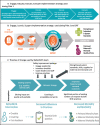Optimizing the development and evaluation of complex interventions: lessons learned from the BetterBirth Program and associated trial
- PMID: 32885188
- PMCID: PMC7427863
- DOI: 10.1186/s43058-020-00014-8
Optimizing the development and evaluation of complex interventions: lessons learned from the BetterBirth Program and associated trial
Abstract
Background: Despite extensive efforts to develop and refine intervention packages, complex interventions often fail to produce the desired health impacts in full-scale evaluations. A recent example of this phenomenon is BetterBirth, a complex intervention designed to implement the World Health Organization's Safe Childbirth Checklist and improve maternal and neonatal health. Using data from the BetterBirth Program and its associated trial as a case study, we identified lessons to assist in the development and evaluation of future complex interventions.
Methods: BetterBirth was refined across three sequential development phases prior to being tested in a matched-pair, cluster randomized trial in Uttar Pradesh, India. We reviewed published and internal materials from all three development phases to identify barriers hindering the identification of an optimal intervention package and identified corresponding lessons learned. For each lesson, we describe its importance and provide an example motivated by the BetterBirth Program's development to illustrate how it could be applied to future studies.
Results: We identified three lessons: (1) develop a robust theory of change (TOC); (2) define optimization outcomes, which are used to assess the effectiveness of the intervention across development phases, and corresponding criteria for success, which determine whether the intervention has been sufficiently optimized to warrant full-scale evaluation; and (3) create and capture variation in the implementation intensity of components. When applying these lessons to the BetterBirth intervention, we demonstrate how a TOC could have promoted more complete data collection. We propose an optimization outcome and related criteria for success and illustrate how they could have resulted in additional development phases prior to the full-scale trial. Finally, we show how variation in components' implementation intensities could have been used to identify effective intervention components.
Conclusion: These lessons learned can be applied during both early and advanced stages of complex intervention development and evaluation. By using examples from a real-world study to demonstrate the relevance of these lessons and illustrating how they can be applied in practice, we hope to encourage future researchers to collect and analyze data in a way that promotes more effective complex intervention development and evaluation.
Trial registration: ClinicalTrials.gov, NCT02148952; registered on May 29, 2014.
Keywords: Childbirth; Complex intervention; India; Intervention development; WHO Safe Childbirth Checklist.
© The Author(s) 2020.
Conflict of interest statement
Competing interestsThe authors declare that they have no competing interests.
Figures
References
Associated data
Grants and funding
LinkOut - more resources
Full Text Sources
Medical
Molecular Biology Databases




